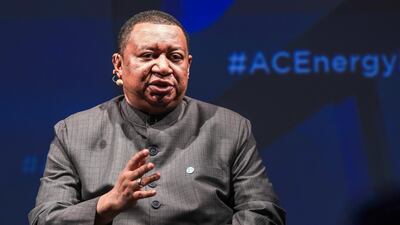Oil entered bearish territory as it continued its plunge to below $70 per barrel, as weak demand outlook and global trade tensions continued to push prices lower, which may prompt Opec+ to extend their pact when they meet later this month.
Brent futures were trading at $61 per barrel at 1:22pm UAE time on Thursday a nearly 16 per cent decline over the last three weeks, its worst performance since January. Meanwhile, US crude benchmark West Texas Intermediate plunged 22 per cent from its April peak, with futures for July settling at $51.68 per barrel for July on Wednesday.
The dramatic decline in oil prices, caused by rising US stockpiles, lukewarm demand growth as well as fears of a US recession have increased the possibility of Opec+ agreeing to an extension well into the second half of the year.
The alliance led by Saudi Arabia and Russia is set to convene towards the end of the month in Vienna to decide on an extension of their production curbs well into the second half of the year. The alliance of 24 producers has been undertaking a cut of 1.2 million barrels per day since the beginning of January.
On Thursday Opec secretary general Mohammad Barkindo said the alliance will take the recent bearishness of the world economy into account when they meet next.
Opec+ will consider significant changes in market sentiment, both equity and financial markets, Mr Barkindo said at a conference hosted by RBC Capital Markets where he delivered his comments through a video link.
“This will all play into our calculations in the upcoming ministerial meetings,” he said.
Investment banks have revised down their outlook for oil prices following the recent tumbles. Washington’s decision to impose 25 per cent tariffs on goods from Mexico and ending preferential trade status to India have all added to the ongoing lull in the global economy.
While maintaining its outlook for Brent at $75 per barrel over the next three months, Swiss bank UBS revised its six month forecast to $70 and its 12-month forecast to $67.
"We foresee falling volumes of 'oil in transit' (oil on tankers moving from producing to consumer countries) translating into lower 'on land' inventories. So we expect the current market focus on trade tensions and oil demand growth to yield soon to the supply dynamics of Opec+ curbs and the lower output from Iran and Venezuela,” the bank said in a recent note.
US investment bank Morgan Stanley observed that Brent’s poor performance was an indication of a bleak demand outlook.
“Even by the standards of the oil market, the recent sell-off has been unusual. There is growing evidence of a sharper-than-expected slowdown in demand,” the bank said in a recent note.
On Tuesday, Saudi energy minister Khalid Al Falih, the de-facto leader of the alliance said the producers would do "whatever it takes" to stabilise the markets, noting that trade tensions in particular concerned the group.
At a technical meeting of the producers in Jeddah last month, consensus moved towards tackling high inventory levels, with Opec+ likely to rollover production curbs from July.


